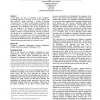Free Online Productivity Tools
i2Speak
i2Symbol
i2OCR
iTex2Img
iWeb2Print
iWeb2Shot
i2Type
iPdf2Split
iPdf2Merge
i2Bopomofo
i2Arabic
i2Style
i2Image
i2PDF
iLatex2Rtf
Sci2ools
101
click to vote
CHI
2002
ACM
2002
ACM
Unremarkable computing
In this paper, we seek to contribute to the Ubiquitous Computing agenda by focusing on one of its earliest, but most difficult, design ambitions ? making technology "invisible in use". We draw on field studies of domestic life as this domain is becoming increasingly important for new technologies and challenges many of the assumptions we take for granted in the design of technologies for the workplace. We use some examples of domestic routines to identify a number of insights into what it means for features of activities to be "unremarkable". We conclude by using these insights to critique some of the current emphases in Ubiquitous Computing research, and suggest how we might better understand the HCI issues of what will be required to develop technologies that really are "invisible in use". Keywords Ubiquitous Computing, Ethnography; Ambient Intelligence; Tangible Interfaces, Domestic Technology; CSCW
CHI 2002 | Human Computer Interaction | Keywords Ubiquitous Computing | Ubiquitous Computing | Ubiquitous Computing Agenda |
Related Content
| Added | 01 Dec 2009 |
| Updated | 01 Dec 2009 |
| Type | Conference |
| Year | 2002 |
| Where | CHI |
| Authors | Peter Tolmie, James Pycock, Tim Diggins, Allan MacLean, Alain Karsenty |
Comments (0)

